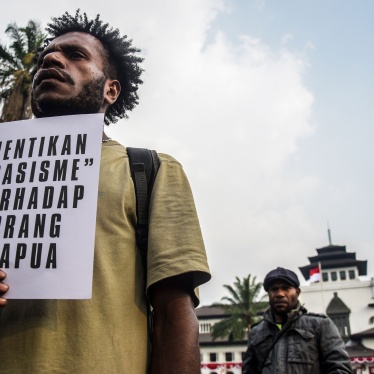A letter to the Committee against Torture in advance of its review of Ukraine, in which key areas of concern not already reflected in its “List of issues” are highlighted in the hope of seeing them taken up during the review. These include the forcible return of Uzbek asylum seekers, migration and asylum policy, and police torture and other ill-treatment undermining efforts to combat HIV/AIDS.
The forcible return of Uzbek asylum seekers
We welcome the emphasis placed by the Committee, as reflected in the “List of issues,” on the forcible return of 10 Uzbek asylum seekers in February 2006. With regard to these returns, we hope that you will challenge any attempt by the government to categorize this action as anything other than refoulement, and request information as to what steps have been taken to hold accountable state agents who were responsible for returning the men.
The committee may recall that the Uzbek asylum seekers were detained February 7, 2006. On February 13, while in custody, they were informed that the migration service had denied their applications for refugee status. The Ukrainian government has claimed that the asylum seekers declined in writing their right to appeal the denial, though it is not at all clear whether this decision was made with the benefit of competent counsel. The men were deported on February 14, following a Simferopol court ruling on their deportation.
The Ukrainian government has acknowledged that the asylum seekers were denied the opportunity to appeal their asylum claim. It also acknowledges that the UN high commissioner for human rights found that Uzbek security forces committed “serious human rights violations, mainly the right to life” and that the UN special rapporteur on torture “repeatedly recognized Uzbekistan as a country, where systematic tortures are applied [sic]” and that torture is used on a massive scale against people charged with crimes against the state.1 Yet senior Ukrainian government officials have stated to Human Rights Watch that in deporting the 10 asylum seekers Ukraine was not in violation of its nonrefoulement obligation.2
Migration and asylum policy
We welcome the emphasis placed in the “List of issues” on questions that address the need to ensure protection of migrants and asylum seekers. Human Rights Watch’s report “Ukraine: On the Margins. Rights Violations against Migrants and Asylum Seekers at the New Eastern Border of the European Union” documents how migrants and asylum seekers in Ukraine are subject to routine detention in appalling conditions, face violence, robbery and extortion, are denied legal assistance and translators, and in some cases are returned to countries where they face persecution, torture or ill-treatment. We hope to see the Committee use the opportunity of its upcoming consideration of Ukraine to emphasize the need for urgent improvements in Ukraine’s treatment of migrants and asylum-seekers as a key component of its obligations under the Convention.
We note that the “List of issues” refers to “diplomatic assurances” against torture and ill-treatment that Ukraine may seek before extraditing or returning a person to a country where he or she is at risk of such abuse. Human Rights Watch opposes reliance upon diplomatic assurances against torture and ill-treatment as they do not provide an effective safeguard against such abuse (see attached, “Diplomatic Assurances against Torture: Questions and Answers,” November 2006). The growing weight of evidence and international expert opinion, including by the UN high commissioner for human rights and the special rapporteur on torture, indicates that diplomatic assurances are inherently unreliable, do not work, and are thus incapable of protecting people at risk of torture upon return to another country.
Governments offering diplomatic assurances have long records of torture, routinely deny that torture is used, and fail to investigate allegations of torture. The dynamics of torture also militate against accountability for a breach of any assurances. Torture is practiced in secret, often with methods that defy detection. Persons subjected to torture are often afraid to reveal the abuse for fear of reprisals against them or their family members. Human Rights Watch has documented cases of individuals who were tortured upon return despite assurances to the contrary. Courts in a number of countries have halted transfers where a person has been at risk of torture ruling that diplomatic assurances secured from the receiving country could not adequately protect a person from abuse. Ad hoc, bilaterally agreed diplomatic assurances undermine the absolute ban on torture enshrined in international law and threaten to weaken the legally-binding international human rights treaty regime.
Police torture and other ill-treatment undermining efforts to combat HIV/AIDS
We welcome the emphasis placed by the Committee on the Ukrainian government’s response to the widespread problem of police harassment and torture in the country. In this regard, we wish to draw your attention to our research findings on HIV/AIDS-related abuses in Ukraine—detailed in a March 2006 report entitled “Rhetoric and Risk: Human Rights Abuses Impeding Ukraine’s Fight against HIV/AIDS”—a dominant feature of which were police actions that violate fundamental human rights protections against torture and other forms of ill-treatment. Our research indicates that these abuses drive those at highest risk of HIV/AIDS away from lifesaving HIV/AIDS prevention, care, and treatment services that the government has pledged to provide. Police in Ukraine subject drug users and sex workers to physical and psychological pressure, including severe beatings, electroshock, partial suffocation with gas masks, and threats of rape, as a means to extort money or information from them.
Our research also found that drug users in particular make especially easy targets for arrest or ill-treatment by police needing to fulfill arrest quotas. Police use drug addiction as a tool to coerce testimony from drug users, who may succumb to pressure to admit to false charges when faced with painful withdrawal symptoms in custody. Ukrainian attorneys and social workers have likewise reported that police intentionally use withdrawal as part of investigative measures to coerce incriminating testimony from drug users; extort money from drug users by threatening to detain them, forcing them to suffer withdrawal; and deny medical assistance to drug users going through withdrawal.
Another systemic factor that contributes to police abuse in Ukraine are the periodic “work plans,” which police reportedly must fulfill, creating an incentive for police to engage in torture or other abusive tactics to extract confessions from criminal suspects. In its 2002 review of Ukraine, the Committee expressed concern about “the numerous convictions based on confessions” in the country, as well as the fact that the “number of solved crimes” was among the “criteria for the promotion of investigators.” The Committee concluded that this factor “can lead to torture and ill-treatment of detainees or suspects to force them to ‘confess.’”3
The expectation that police will solve a high number of crimes, and that this is a measure of police success, also encourage police to seek out easy targets for arrest. In this regard, we note that the “List of issues” asks whether particular groups, such as members of some minorities, have been most at risk in facing acts of torture and ill-treatment, and would like to draw your attention to our research indicating that drug users and sex workers are among those at particular risk of facing torture and ill-treatment for police needing to fill arrest quotas, for the reasons described above.
We were pleased to note that the Committee has specifically asked the Ukrainian government for information about concrete steps taken with respect to the exclusion of coerced statements as evidence, and encourage you in this regard to ask specifically about measures taken to ensure that statements coerced from drug users in withdrawal are excluded.
In questioning the Ukrainian government about concrete steps taken to address police harassment and torture, we also encourage you to ask about the following:
1. What steps have been taken to reform the evaluation of police performance so that the evaluation standard of effectiveness is not based on the simple counting of solved cases but instead on the impact of law enforcement activities on combating major crimes?
2. What steps have been taken to reform policies that permit or encourage police practices that cause mental and physical suffering to the victim, such as the use of drug withdrawal to coerce testimony from drug users?
3. What steps have been taken to ensure that drug users and sex workers are able to file complaints about police harassment or torture against them?
4. What steps have been taken to stop the unlawful use of force and other ill-treatment by police and other agents of the state against drug users and sex workers, including measures to stop interference by police and other agents of the state with HIV/AIDS prevention, care, and treatment services for drug users?
Thank you very much for your consideration, and with best wishes for a productive session.
Sincerely,
Holly Cartner
Executive Director
Europe and Central Asia Division
Human Rights Watch
Joe Amon
Director
HIV/AIDS Program
Human Rights Watch
[1] Ministry of Justice letter no. B-8320-18 of May 3, 2006 from Deputy Minister of Justice D.M. Kotliar to M.O. Butkevych.
[2] Human Rights Watch interview with Sergei Rudyk, head of the State Committee on Migration and National Minorities, September 2006. The Ministry of Interior, meanwhile, simply denied any involvement and said the agency responsible was the security services, on whose activities it could not comment.
[3] The Ukrainian government itself has acknowledged police detectives’ “wrong understanding of crime disclosure rate as the main criteria of the efficiency of their work” as a factor in police abuse, stating that this “wrong understanding” was “why some officers try to achieve the high crime disclosure by any means.” See Response of the Ukrainian Government to the report of the European Committee for the Prevention of Torture and Inhuman or Degrading Treatment or Punishment on its first visit to Ukraine from 24 November to 6 December 2002, p. 7.






